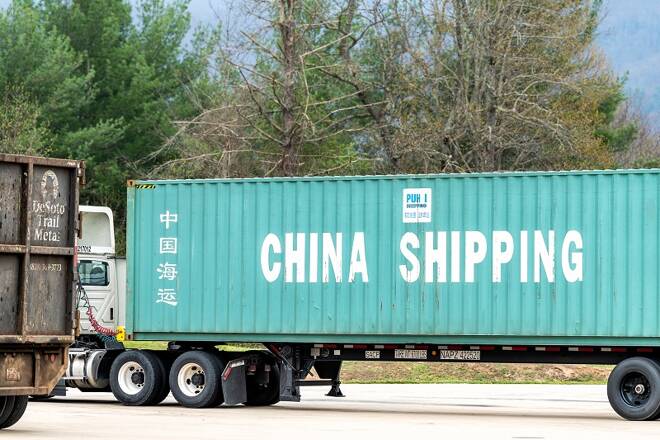Advertisement
Advertisement
China Tariffs on U.S. Crude Not Game-Changing Event
By:
Wednesday’s knee-jerk reaction to the announcement of the tariffs was a typical move by traders. Anytime, a major players hears potentially bad news about demand, they sell first and ask questions later. The news is not a trend changing event and should help keep a lid on prices. However, lingering concerns over the sanctions on Iran and falling U.S. inventories should be supportive over the near-term.
U.S. West Texas Intermediate and international-benchmark Brent crude oil futures are under pressure early Wednesday after China said it will retaliate against the latest round of U.S. tariffs on Chinese imports.
China’s announcement came just a day after the U.S. Trade Representative’s office released a finalized list of $16 billion worth in Chinese goods that will be hit with tariffs, effective August 23.
The Chinese Ministry of Commerce announced a 25 percent charge on $16 billion worth of U.S. goods including coal, grease, Vaseline, asphalt and plastic products, and recyclables. Larger items are also on the list of 333 goods being targeted including large passenger cars and motorcycles as well as various fuels, and fiber optical cables.
No Surprise
Crude oil prices are under pressure because a tariff on imported U.S. crude oil means a drop in demand. As demand drops, U.S. stockpiles should build, pressuring prices. The selling pressure could be limited, however, because the move by China did not come as a surprise.
As early as July 5, the story of tariffs on U.S. crude by China had been floated. At that time, Beijing threatened a 25 percent tariff on U.S. crude imports, although it did not issue a specific date for the move.
American crude shipments to China are around 400,000 barrels per day (bpd), worth $1 billion a month at current prices. Tariffs would make U.S. oil uncompetitive in China.
Additionally, an executive from China’s Dongming Petrochemical Group said at the time that he expected Beijing to soon impose the tariff on U.S. oil imports. He further added that his refinery had cancelled U.S. crude imports and would switch to Middle East or West African supplies instead.
Just last week, China’s Unipec, the trading arm of state oil major Sinopec, suspended crude oil imports from the United States due to the growing trade spat between Washington and Beijing. Unipec and Sinopec are Asia’s largest refiner and biggest buyer of U.S. oil.
Minimal Impact
The absence of China, the largest buyer of U.S. crude after Canada, is likely to partly weigh on U.S. spot crude prices, making them more affordable for other buyers in Asia. China’s prohibitive import tariff, which amounts to close to $18 a barrel when crude is at $70, should also deter other Chinese buyers such as state-owned companies Petro China, as well as state-controlled Zhenhua Oil and independent refiners, from importing U.S. crude.
Conclusion
Wednesday’s knee-jerk reaction to the announcement of the tariffs was a typical move by traders. Anytime, a major players hears potentially bad news about demand, they sell first and ask questions later. The news is not a trend changing event and should help keep a lid on prices. However, lingering concerns over the sanctions on Iran and falling U.S. inventories should be supportive over the near-term.
All of this adds up to range bound trade over the near-term. The markets will turn weaker if the tariff damage starts to show up in U.S. inventories numbers, but since Chinese refiners had been limited buyers since early July, it may not show up in the numbers for weeks.
About the Author
James Hyerczykauthor
James Hyerczyk is a U.S. based seasoned technical analyst and educator with over 40 years of experience in market analysis and trading, specializing in chart patterns and price movement. He is the author of two books on technical analysis and has a background in both futures and stock markets.
Advertisement
